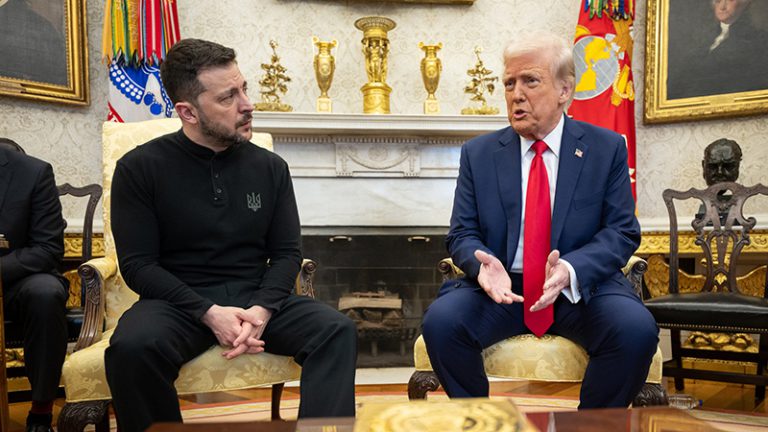
The onslaught of US President Donald Trump’s “America First” foreign policy, while anticipated since the November 2024 election, has surprised the world with its depth and ferocity. Three months into Trump’s second term, many countries are now exploring what it means to be an American ally in a world where many basic assumptions seem to have changed overnight. Where will it lead? The degradation or even the destruction of the post-World War II order constructed in large part through US efforts seems to be well underway—but what comes after is not clear.
Trump’s Second Coming: A Global Divide?
Donald Trump’s second presidency has seemed to throw the world into a state of disorder, in which common assumptions about the role of the United States in international affairs have been overturned, and the ideals for which the United States once apparently stood have been cast aside. Democracy, human rights, and free trade are out; authoritarianism, imperialism, and protectionism are in.
The near reversal of long-held American foreign policy positions, along with the assault on the international order, have badly damaged America’s global reputation, at least with US allies.
Polling by the European Council on Foreign Relations in November 2024 revealed that majorities in such countries as Brazil, India, Russia, Saudi Arabia, and Turkey thought that Trump’s election would be good for American citizens (and by extension, for their own nations). This view was apparently predicated on the expectation that Trump would turn the United States into a “normal” great power, with transactional policies that would allow other countries to thrive in a multipolar system. In sharp contrast, the ECFR poll found that European countries did not see Trump’s return to power as a welcome development.
A February 2025 YouGov.UK poll of seven European countries showed that throughout Europe, favorable attitudes toward the United States had fallen by between 6 and 28 percentage points following Trump’s return to office. “In Great Britain, Denmark, Sweden, Spain and Italy, these are the lowest figures for USA favourability since we began tracking this question,” the pollsters noted. They added that “opinion towards the US is least positive in Denmark, at 20%, with fellow Scandinavians in Sweden coming next on 29%. Only around a third of people in Germany (32%), France (34%) and the UK (37%) have a favourable view of the US now. Italians and Spaniards are the most likely to have a favourable view, although this still represents fewer than half of people there feeling this way, at 42% and 43% respectively.”
The rout of the American reputation, it seems, is on, at least in Europe.
Canada, Mexico, the EU, and Asia: Shifting Views and Strategies
The practical effects have been manifested in several foreign policy shifts among putative US allies and adversaries alike. Canada and Mexico, the two top trading partners of the United States, have been rocked by the on-again, off-again imposition of tariffs (and tariff exceptions) on many goods. Despite exemptions in some categories, trade tensions remain high, and both countries have threatened retaliatory tariffs of their own.
Alongside official threats and counter-threats, economic nationalism has spiked in both US neighbors. In Canada, demand for US goods has fallen sharply while interest in Canadian products has soared. Canadian Prime Minister Mark Carney pronounced in March that “the old relationship we had with the United States based on deepening integration of our economies and tight security and military cooperation is over,” and testy US-Canada relations (amplified by Trump’s insistence that Canada become the 51st state of the union), became a lead issue in Canada’s April 28 general election. The dramatic come-from-behind victory of the Liberal Party and Premier Carney was due in no small part to a surge in Canadian nationalism powered by anti-Trump sentiment. Carney has promised a new relationship with the United States, which includes less dependence and a more prominent role in global affairs, as well as closer ties to the European Union. Mexican President Claudia Sheinbaum has pressed forward with Plan Mexico, a strategy to advance her country’s domestic production and economic strengths in a number of areas. Once aimed primarily at competing more effectively with China, the plan now envisions inoculating Mexico against Trump’s trade wars. Opposition to Trump has become a galvanizing factor in the politics of both countries, boosting the popularity of leaders willing to stand up to the US president.
EU members have been shocked into a proactive trade offensive.
European Union (EU) countries are now following suit. Roiled by Trump’s imperialist demands for control of Greenland (administered by NATO ally Denmark), and by his imposition of tariffs on EU goods (mostly suspended on April 9 for a 90-day period) EU members have been shocked into a proactive trade offensive. Since December 2024, the EU has gone on a free-trade deal making binge, concluding many longstanding trade negotiations around the world and seeking a free-trade agreement with India and stronger cooperation with the Comprehensive and Progressive Agreement for Trans-Pacific Partnership, which includes countries from the Indo-Pacific region as well as the United Kingdom. As one former EU commissioner told Politico, “Trump’s policy will lead everyone to agree to develop trade relationships with the rest of the world and therefore also further increase the number of free-trade agreements.”
EU Commission President Ursula von der Leyen suggested this went beyond mere trade issues. Also speaking to Politico, she said that “in a more and more unpredictable global environment, countries are lining up to work with us… [and seeking] strong, reliable partners” as global order is “shifting more deeply than at any time since the Cold War ended.”
Repercussions of these shifts are, as von der Leyen observed, not just economic. They are being felt in the security realm as well.
The Trump administration’s antagonism toward Ukraine—including its new proposal that Kyiv must recognize Russia’s illegal annexation of Crimea as part of any peace deal—and calls for greater European military self-sufficiency, to the point of ill-disguised threats, have convinced many if not all NATO members that the United States is no longer reliable, and that they must increasingly take matters into their own hands. In March, the EU announced its “Readiness 2030” Plan, designed to meet the Russian challenge with a reinvigorated European defense industry intended to break the Union’s policy and military reliance on Washington. Under this plan, Europe would produce and purchase more of its own weapons and presumably take a security stance that is more independent from the United States. The effects are not expected to be confined to Europe: its defense industry shifts are also likely to capture additional market share from the American defense industry, as many US allies beyond Europe seek to diversify their own defense supply lines from an increasingly erratic United States.
Vibes have changed among US allies in Asia and the Pacific, too. Former prime minister of Australia Malcolm Turnbull said in April, “We are dealing with a very different America… We’re dealing with an America whose values no longer align with ours.” The defense minister of Singapore remarked in a February 14 address that “the image [of the US] has changed from liberator to great disruptor to a landlord seeking rent…I think in any scenario, China will be a key player,” albeit with major interplay between Washington and Beijing. How these observations will, if at all, translate into policy, remains to be seen.
China, Russia, and the Middle East: The Great Game Is Afoot
As the global order becomes more scrambled, both China and Russia are expected to make gains. China in particular sees opportunities for greater global influence in the face of what appears to be an American retreat. President Xi Jinping recently paid an important visit to Malaysia, Vietnam, and Cambodia and made a case for aligning with China instead of the United States. In Kuala Lumpur, Xi stated that “high-level strategic cooperation” was “good for the common interests of both China and Malaysia, and good for peace, stability and prosperity in the region and the world,” a message that was a strong theme in his other stops in the region. Dozens of trade and cooperation agreements followed in his wake.
The idea of a Nasser-style non-alignment has become more acceptable among states of the region.
That message seemed intended to echo beyond southeast Asia. It is most likely to be heard in the Middle East, where China has made major inroads in the last several years, becoming the region’s major trading partner in 2016 even as the region emerged as a primary node of China’s Belt and Road Initiative. Over the last eight years in particular, between Trump’s aggressive and erratic foreign policies and President Joe Biden’s relative complacency and timidity, the idea of an updated Gamal Abdel Nasser-style non-alignment has become, quietly, more acceptable among states of the region, and Chinese overtures may offer an attractive way forward.
Russia, too, theoretically stands to gain from the power vacuum afforded by American confusion, withdrawal, and unpredictability, but here it is a bit more complicated. Russia’s preoccupation with its war of aggression against Ukraine, as well as its resulting economic difficulties, have meant that Moscow has limited bandwidth to take advantage of possible global opportunities. Russia’s alliance with Iran and its significant dependence on Iranian weapons in the war against Ukraine has meant that Arab countries traditionally at odds with the Islamic Republic, particularly the Gulf states, are somewhat more reluctant to pursue closer relations with Moscow at present. (Israel’s destruction in 2024 of Iran’s Russian-made S-300 anti-aircraft missile systems, a cornerstone of the Islamic Republic’s air defenses, did not improve the reputation of Russia’s arms industry, upon which much of Russia’s appeal to Middle East governments rests.) But Russia, like China, plays a longer game, and will remain alert to opportunities to expand its influence at Washington’s expense. As the United States begins decreasing its troop presence in Syria, for example, that country’s new president, Ahmed al-Sharaa, has speculated about increasing military ties with Assad’s old ally, Moscow.
Make American Rivals Great Again
Washington’s retreat from global structures and alliances that have served to keep the peace and to cement Washington’s economic, diplomatic, and military influence for many decades, are troubling enough on their own. But the willful destruction of American soft power, exemplified by the dissolution of the US Agency for International Development and the Voice of America, among other institutions, leaves a major gap of influence that can and will be exploited by US friends (the EU) and rivals (China). The proposed reorganization, downsizing, and financial gutting of the US Department of State proposed under Secretary Marco Rubio—including plans for a shrunken Bureau of Democracy, Human Rights and Labor—will significantly weaken American diplomacy and advocacy on behalf of important causes, friends, and voiceless people alike. This will reinforce downward trends in the reputation and influence of the United States for years to come.
Some may argue that Trump administration policies, disruptive and chaotic though they may be, will spur much-needed military and economic innovation and self-sufficiency from American allies, freeing Washington from the need to be the world’s policeman and enabling the United States to do deals on its own terms and in its own interests, thus making America “great” again. But the emptying of the US tool chest, including of the alliances and structures that truly made America great, is more likely to lead to weakness and exposure to other, more ancient great powers who have long experience in just the kind of politics that the United States has, at least in the last century, largely eschewed. A new world order may be on the way, but it most likely will not be one conducive to peace and security—or even to US interests.
The views expressed in this publication are the author’s own and do not necessarily reflect the position of Arab Center Washington DC, its staff, or its Board of Directors.
Featured image credit: Flickr/The White House

